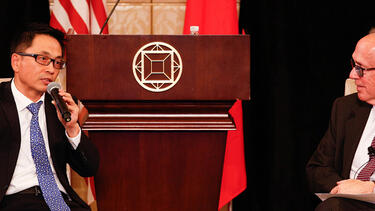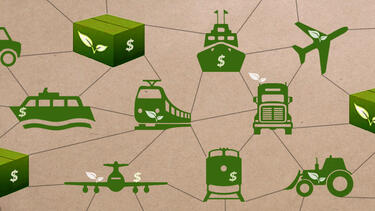Global Business
Better Sanctions Can Weaken Russia
Yale SOM’s Jeffrey Sonnenfeld, who has helped lead the movement to isolate Russia, and co-author Steven Tian write that the current sanctions regime is spottily enforced and ignores key commodities exports. They suggest three steps policymakers should take to give economic sanctions real bite.

Is China Ready for Luxury Fashion?
Every global company wants to be in China. But for any company, accessing the Chinese market comes with unique questions and challenges. Chris Cabot ’97, the president of Value Retail China, talked with Yale Insights about how he expanded his company’s luxury outlet shopping villages into China. The first step to doing business in China, he says, is to assume you know nothing.

How Do You Invest in a Changing China?
Lei Zhang ’02 has been one of the most successful investors in China during a time of unprecedented change. In a conversation with Yale’s Stephen Roach, he talked about rapid shifts in China’s business and culture, the birth of a consumer class, the Chinese innovation model, and the outmoded views of the country that remain prevalent in the West.

Where are the Boundaries for Economic Growth in China?
With global population projected to rise to 9.6 billion by 2050, the pressure on natural systems that provide food, energy, water, and other resources necessary for human life is a major strategic challenge for business and society. China, with its large population and rapid economic development, is a big piece of the puzzle.
Should Europe Stay a Union?
Continuing weakness in the European economy, plus squabbling between Germany and France over the direction of Europe, has sparked new concerns about the future of the Eurozone. But José Manuel Barroso, president of the European Commission, argues that reforms made since the last financial crisis should help keep Europe afloat.
Can Ecotourism Boost the Economy in the Philippines?
Millions of people around the world want to swim in tropical waters and take in unsullied wilderness. Can the Philippines build a productive ecotourism industry around its natural environment? The Asian Institute of Management’s Fernando Y. Roxas talks about the country’s chances of claiming a link in the “tourism supply chain.”

How Do We Work Across Cultures?
Globalization means that people from different countries are working together more and more. In her research, INSEAD’s Erin Meyer examines the cultural differences that can trip up global business relationships—and proposes methods for avoiding problems.
How Do You Make the Case for Corporate Responsibility?
What obligations does a corporation have to society? The way that question is answered has evolved over time. So have the tools of those working to expand the role of corporate social responsibility and sustainability.
Firms’ Shared Ties Hurt Merger Performance
Merger performance varies greatly depending on the number of pre-merger third-party ties connecting the acquiring firm to its partner, according to a new study by researchers at the Yale School of Management and INSEAD.
How Do You Hire When Everything Keeps Changing?
How do companies with rapidly evolving business plans and a constantly shifting competitive landscape hire the right people for tomorrow, let alone next year? While education and training still matter, Laszlo Bock, head of people operations at Google, says that the company looks for people with the ability to learn, solve problems, and step in when leadership is needed.

What’s the CFO’s Take on Sustainability?
Does sustainability clear the fiscal hurdle? Yale Insights talked with Kurt Kuehn, chief financial officer for UPS, about how he evaluates sustainability initiatives in the face of a fast-changing and complex global market.
